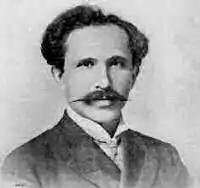Morris Rosenfeld
Morris Rosenfeld (Yiddish: מאָריס ראָסענפֿעלד; born as Moshe Jacob Alter; December 28, 1862 in Stare Boksze in Russian Poland, government of Suwałki – June 22, 1923 in New York City) was a Yiddish poet.
Morris Rosenfeld | |
|---|---|
 Morris Rosenfeld in Stare Boksze, Russian Poland | |
| Born | Moshe Jacob Alter December 28, 1862 Stare Boksze, Poland, Russian Empire |
| Died | June 22, 1923 (aged 60) New York City, United States |
| Occupation | publisher, editor, poet |
| Language | Yiddish |
His work sheds light on the living circumstances of emigrants from Eastern Europe in New York's tailoring workshops.
He was educated at Boksha, Suwałki, and Warsaw. He worked as a tailor in New York and London and as a diamond cutter in Amsterdam, and settled in New York in 1886, after which he was connected with the editorial staffs of several leading Jewish newspapers. During the 1890s he wrote song parodies for the Yehuda Katzenelenbogen Music Publishing Company in New York, including Nokhn ball (After the Ball), Di pawnshop (Faryomert farklogt) and Nem tsurik dayn gold (Take Back Your Gold) - all[1] published in Di idishe bihne and Lider magazin. In 1904 he published a weekly entitled Der Ashmedai. In 1905 he was editor of the New Yorker Morgenblatt. He was also the publisher and editor of a quarterly journal of literature (printed in Yiddish) entitled Jewish Annals. He was a delegate to the Fourth Zionist Congress at London in 1900, and gave readings at Harvard University in 1898, the University of Chicago in 1900, and Wellesley and Radcliffe colleges in 1902.
Rosenfeld was the author of Di Gloke [The bell] (New York, 1888), poems of a revolutionary character; later the author bought and destroyed all obtainable copies of this book. He wrote also Di Blumenkette [The chain of flowers] (New York, 1890) and Dos Lieder-Bukh (New York, 1897; English transl. by Leo Wiener, Songs from the Ghetto, Boston, 1899; German transl. by Berthold Feivel, Berlin, and by E. A. Fishin, Milwaukee, Wis., 1899; Rumanian transl. by M. Iaşi, 1899; Polish transl. by J. Feldman, Vienna, 1903; Hungarian transl. by A. Kiss, Budapest; Bohemian transl. by J. Vrchlický, Prague; Croatian transl. by Aleksandar Licht, Zagreb, 1906). His collected poems were published under the title Gezamelte Lieder, in New York, in 1904.
Works

- "Di gloke" (The Bell), Poetry collection, 1888
- "Di blumenkette" (The Chain of Flowers), Poetry collection, 1890
- "Lider-bukh", Poetry collection
- First English edition: Songs from the Ghetto. Translated by Leo Wiener. New York, 1898
- First German edition: Lieder des Ghetto (songs from the ghetto). Translated by Berthold Feiwel. Calvary, Berlin, 1902
- "Shriftn", selected works in six volumes, New York, 1908–1910
- "Geveylte shriftn", New York, 1912
- "Dos bukh fun libe", 1914
- Songs of Labor and Other Poems. Translated by Rose Pastor Stokes and Helena Frank. Boston: Richard G. Badger, 1914.
References
- Di idishe bihne
- Poet of the ghetto. Morris Rosenfeld. Hrsg. von Edgar J. Goldenthal. Ktav, Hoboken NJ 1998, ISBN 0-88125-600-5 (enthält eine Auswahl der Werke)
- Tzum hundertstn Geboirntog fun Morris Rosenfeld. Zamlung. Hrsg. von Nachman Meisel. YKUF, New York, 1962 (enthält eine Auswahl der Werke)
- Bibliography of Jewish Encyclopedia: American Jewish Year Book, 1904-5 by Cyrus Adler, Frederick T. Haneman
External links
- Works by Morris Rosenfeld at Project Gutenberg
- Works by or about Morris Rosenfeld at Internet Archive
- Works by Morris Rosenfeld at LibriVox (public domain audiobooks)

- JewishEncyclopedia
- Two poems by Rosenfeld translated from Yiddish into English by Alice Stone Blackwell
- (in English) translation of Rosenfeld's Requiem for the victims of the Triangle Shirtwaist Factory fire, published in the Jewish Daily Forward
- Guide to the Papers of Morris Rosenfeld, held at YIVO Institute for Jewish Research, New York
- Songs from the Ghetto, free download
- songs from the Ghetto, scanned copy, 1900 edition, from the National Library of Israel
- "My little son" on YouTube